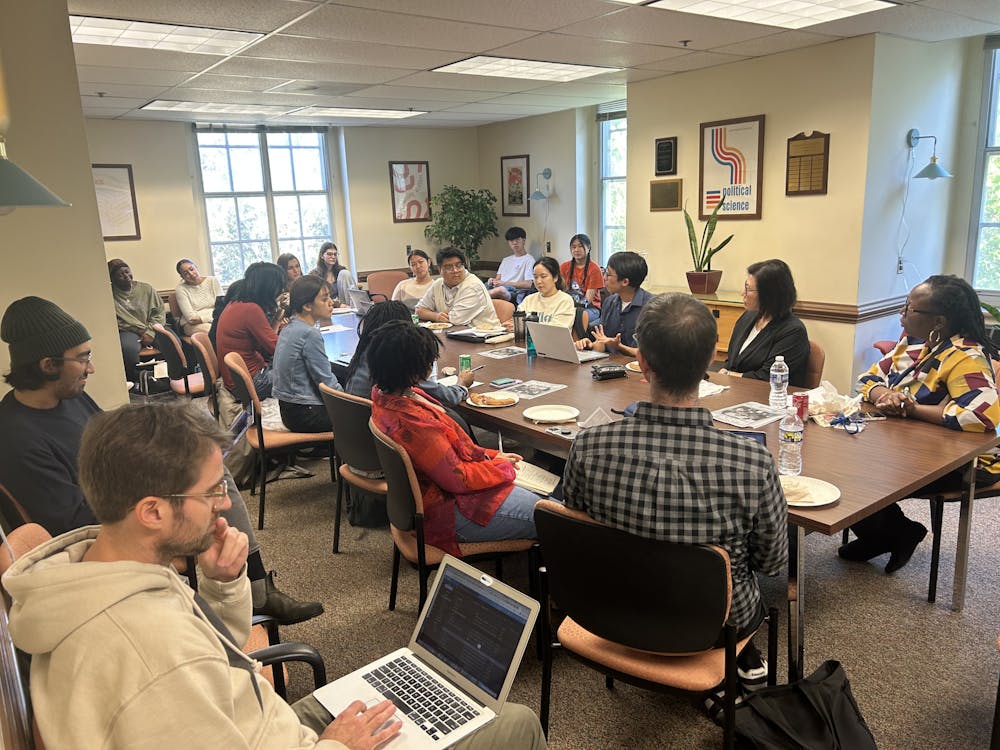The Program in Racism, Immigration and Citizenship (RIC) hosted the first of a two-part conversation on Friday, Oct. 13 to discuss the importance of community-engaged research, the critical diaspora studies major and the new Penn 555 building in Washington D.C.
The event included brief presentations by both faculty members and undergraduate students, moderated by senior Kobi Khong. The conversation began with opening statements from Dr. Stuart Schrader, associate director of the RIC. Schrader explained that though most majors are open to a community-engaged research component, the RIC’s new undergraduate major, Critical Diaspora Studies (CDS), makes it a central feature.
“The reason we are here today is for you to hear from some experts, both faculty and students, on community-engaged research and learning, why it's important, what the value of it is for people’s intellectual, spiritual and political growth and how it raises challenges as well,” he said.
The first presentation of the afternoon was by Dr. Erin Aeran Chung, the founding co-director of the RIC and a current member of the curriculum committee for the CDS major alongside Schrader.
In her presentation, Chung described the development of the CDS major, which was catalyzed by the Atlanta shootings of Asian women in 2021.
“[The CDS major was created] largely to address anti-Asian violence and the history of anti-Asian violence with the goal of enabling community members both at Hopkins and in the larger Baltimore community to make anti-racism more central to their teaching, research and outreach efforts, as well as to foster community building and leadership among community members,” she said.
Chung also discussed the lack of collective historical knowledge on the Asian community in Baltimore as a motivator for some community-engaged research projects.
Following Chung’s discussion, Dr. Shawntay Stocks’s presentation emphasized the importance of listening and working with community leaders in research instead of speaking over them. Stocks highlighted the necessity for reflexivity when working with communities and considering our own identities and affiliations as researchers.
“People always say there’s no ‘I’ in team, but there is an ‘I’ in community. There is an ‘I’ in unity, right?” she said. “It’s always important to think about ourselves in this work, because in the work that we do, it’s not neutral. We don’t believe in neutrality. You work through who you are. You serve through who you are.”
Stocks is the Associate Director of Fellowships and Community Engagement with Inheritance Baltimore, a program that aims to use the humanities and arts education at the University to share the resources from inside Hopkins with Black Baltimore.
Stocks discussed the importance of working with communities by first reaching out to community leaders and community organizations that already exist.
“Community-based research asks that communities be at the table when designing projects, that the community has a voice in the project, that they themselves are seen as researchers, co-researchers in the project as well,” she explained.
Following the presentations by Chung and Stocks, three undergraduate students shared insights they received from conducting community-engaged research projects themselves.
Junior Ethan Tan researched the experience of Chinese-American immigrant life, particularly in the context of Chinese restaurants. This led him to partner with members of the Chinese community in Baltimore. Junior Angela Tracy and Sophomore Vanessa Han shared their experience conducting interviews and focus groups with the Asian American and Pacific Islander community in Baltimore.
Tracy and Han are students of Dr. H. Yumi Kim, who teaches the History Research Lab: Asian Diasporas in Baltimore at Hopkins. The course focuses on archive-based research into local Asian-descended communities within Baltimore.
A graduate student in attendance, Minah Kang, who was once a student in Kim’s class, shared her thoughts on Tracy and Han’s presentation in an interview with The News-Letter.
“It was very impressive that a class project can develop into this long-standing project and create an archive,” Kang said.
Towards the end of the event, Schrader discussed the campus addition in D.C. as an opportunity to invest more resources in community-engaged projects.
“The increase of undergraduate programming in D.C. is happening with us or without us,” he said. “We feel like it's better if faculty who are interested in having a community-engaged piece to it are there.”
CDS courses can be taught at the 555 Penn location since the program won a Nexus Award. After a competitive process, 40 projects and programs were chosen as awardees, including “Critical Diaspora Studies in the Baltimore-Washington Region.” These awardees will receive funding in order to support convening, research and teaching at the new building.
In an interview with The News-Letter, Administrative Assistant for CDS Ga Eun Cho, a current PhD student, explained how some of the funding will be used by the CDS program next semester.
“Kim and Schrader will run classes next semester mainly based in Baltimore, but some weeks will have field trips in D.C. The [Nexus] initiative gets us funding to facilitate those field trips, hopefully getting students to do internships in Baltimore and D.C., centered around the opportunities that the 555 building presents,” she said.
In an interview with The News-Letter, Tan explained that the creation of more CDS research projects gives all Hopkins students more opportunities to interact with local community and leave a lasting impact.
“Participating in community-engaged research, even while in a STEM field of study, could go a long way in helping to rebuild trust with the community about what the Hopkins legacy and mission is,” he said.
The RIC will host the second part of this event at the 555 Penn building on Nov. 4.

















